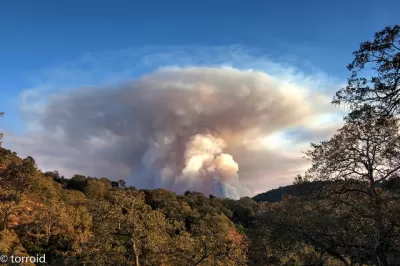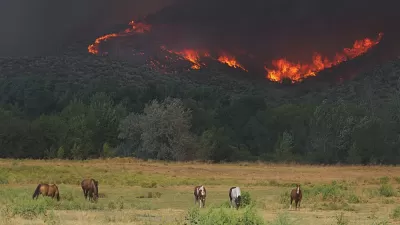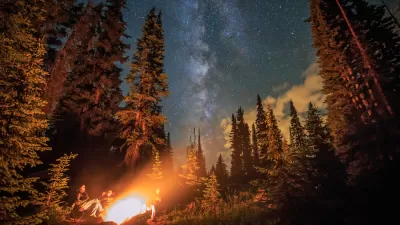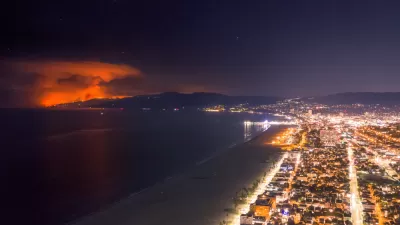In the Western states, an especially hot summer stoked the yearly blazes, to many experts' surprise. For some, bigger wildfires are a "canary in the coal mine" for climate change.

After prolonged drought in many Western states gave way to much-needed rainfall last winter, wildfire experts expected a tame summer. Instead, they got millions of acres burned, including the largest brushfire in Los Angeles' history.
As Robinson Meyer writes, "The answer lies in the summer's record-breaking heat, say wildfire experts. Days of near-100-degree-Fahrenheit temperatures cooked the Mountain West in early July, and a scorching heat wave lingered over the Pacific Northwest in early August."
Meyer calls on several experts, including Park Williams, a research scientist at the Lamont-Doherty Earth Observatory at Columbia University. "This excessive heat can have an outsize effect on the size of forest fires. For more than three decades, wildfire researchers have known that fire and aridity, which is controlled by heat, exist in an exponential relationship. Every degree of warming does more to promote fire than the previous degree of warming, Williams said."
Williams also referred to intense wildfires as a "canary in the coal mine" for the effects of climate change, specifically of the human-caused variety.
FULL STORY: Has Climate Change Intensified 2017’s Western Wildfires?

Planetizen Federal Action Tracker
A weekly monitor of how Trump’s orders and actions are impacting planners and planning in America.

Map: Where Senate Republicans Want to Sell Your Public Lands
For public land advocates, the Senate Republicans’ proposal to sell millions of acres of public land in the West is “the biggest fight of their careers.”

Restaurant Patios Were a Pandemic Win — Why Were They so Hard to Keep?
Social distancing requirements and changes in travel patterns prompted cities to pilot new uses for street and sidewalk space. Then it got complicated.

California Homeless Arrests, Citations Spike After Ruling
An investigation reveals that anti-homeless actions increased up to 500% after Grants Pass v. Johnson — even in cities claiming no policy change.

Albuquerque Route 66 Motels Become Affordable Housing
A $4 million city fund is incentivizing developers to breathe new life into derelict midcentury motels.

DC Area County Eliminates Bus Fares
Montgomery County joins a growing trend of making transit free.
Urban Design for Planners 1: Software Tools
This six-course series explores essential urban design concepts using open source software and equips planners with the tools they need to participate fully in the urban design process.
Planning for Universal Design
Learn the tools for implementing Universal Design in planning regulations.
Heyer Gruel & Associates PA
JM Goldson LLC
Custer County Colorado
City of Camden Redevelopment Agency
City of Astoria
Transportation Research & Education Center (TREC) at Portland State University
Camden Redevelopment Agency
City of Claremont
Municipality of Princeton (NJ)





























